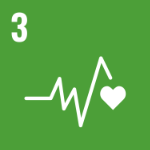

3. Good health and well-being

17. Partnerships for the goals
COVID-19 vaccine acceptance and hesitancy in low- and middle-income countries
ABSTRACT
Widespread acceptance of COVID-19 vaccines is crucial for achieving sufficient immunization coverage to end the global pandemic, yet few studies have investigated COVID-19 vaccination attitudes in lower-income countries, where large-scale vaccination is just beginning. We analyze COVID-19 vaccine acceptance across 15 survey samples covering 10 low- and middle-income countries (LMICs) in Asia, Africa and South America, Russia (an upper-middle-income country) and the United States, including a total of 44,260 individuals. We find considerably higher willingness to take a COVID-19 vaccine in our LMIC samples (mean 80.3%; median 78%; range 30.1 percentage points) compared with the United States (mean 64.6%) and Russia (mean 30.4%). Vaccine acceptance in LMICs is primarily explained by an interest in personal protection against COVID-19, while concern about side effects is the most common reason for hesitancy. Health workers are the most trusted sources of guidance about COVID-19 vaccines. Evidence from this sample of LMICs suggests that prioritizing vaccine distribution to the Global South should yield high returns in advancing global immunization coverage. Vaccination campaigns should focus on translating the high levels of stated acceptance into actual uptake. Messages highlighting vaccine efficacy and safety, delivered by healthcare workers, could be effective for addressing any remaining hesitancy in the analyzed LMICs.
MAIN
To promote vaccination against COVID-19, we need to know whether people are willing to take COVID-19 vaccines, the reasons why they are willing or unwilling to do so, and the most trusted sources of information in their decision-making. Our study investigates these questions using a common set of survey items deployed across 13 studies in Africa, South Asia and Latin America (Table 3): seven surveys in low-income countries (Burkina Faso, Mozambique, Rwanda, Sierra Leone and Uganda), five surveys in lower-middle-income countries (India, Nepal, Nigeria and Pakistan) and one in an upper-middle-income country (Colombia). We compare these findings to those from two countries at the forefront of vaccine research and development, Russia (upper-middle income) and the United States (high income).
To select studies to include in our sample, we conducted an internal search within Innovations for Poverty Action (IPA), the International Growth Center (IGC) and the Berlin Social Science Center (WZB) for projects with plans to collect survey data in the second half of 2020. Study investigators agreed to include a set of common questions about COVID-19 vaccine attitudes. This strategy was guided by the need to collect information quickly and cost-effectively using a survey modality (phone) that was both safe, given pandemic conditions, and appropriate for contexts with limited internet coverage. The final set of samples included in our study therefore reflects populations that fall under the current research priorities at IGC, IPA and WZB and, in the case of IPA and IGC, donors that prioritize working in the Global South.
Our main results are shown in Fig. 1 and are reproduced as Supplementary Table 1. The first column provides overall acceptance rates in each study, while the remaining columns disaggregate acceptance by respondent characteristics. The ‘All LMICs’ row reports averages for the LMIC samples included in our study and excludes Russia and the United States. The ‘All LMICs (national samples)’ row reports averages for just the LMIC samples with national-level geographic coverage.

For more information and access the research paper, click here

